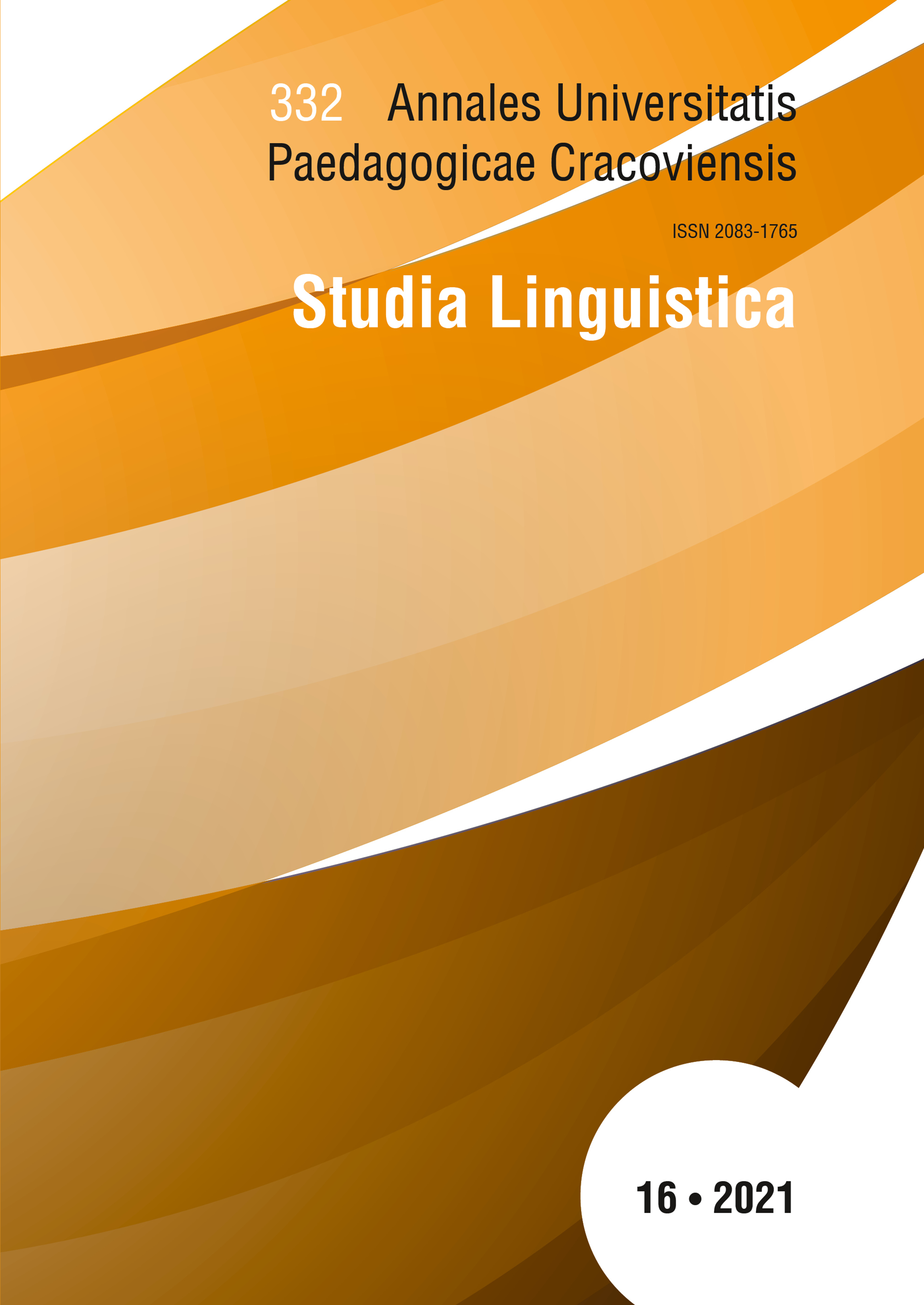Life in the city on the basis of lexical analysis of lviv’s „Morning Courier” chronicles from 1928
Main Article Content
Abstract
The purpose of the article is the reconstruction of fragmentary picture of life in Lviv 93 years ago. The material basis are the chronicles from archive issues of „Morning Courier” from 1928, available in the Library of Lviv National University of Ivan Franko. The definition and function of press chronicle is assumed in the article according to Magdalena Pietrzak genologic research. The attention was paid to the creative character of the media communication and the sociolinguistic understanding of the city as a specific place in the social space (acc. to Kwiryna Handke). The example material was classified according to semantic aspects included in lexical definition of the noun life (above all economic, craftsman, business, political, cultural, religious => social life) codified in The Great Dictionary of Polish Language edited by Piotr Żmigrodzki in the online version.
Downloads
Article Details

This work is licensed under a Creative Commons Attribution-NonCommercial-NoDerivatives 4.0 International License.
Author, submitting a text to the editorial board of the journal “Annales Universitatis Paedagogicae Cracoviensis. Studia Linguistica", certifies that the content of the article has not been published so far and that the work does not violate in any way the copyright or related rights of other person, as well as other rights of third parties, and that no one's rights to the work (or any part thereof) have been missed. After signing the contract, the property rights to the published materials are transferred to the Scientific Publisher of the University of the National Education Commission, Krakow.
“Annales Universitatis Paedagogicae Cracoviensis. Studia Linguistica” is an open access journal, and all its content is made available free of charge to users and institutions under the Creative Commons CC-BY-NC-ND 4.0 license (attribution, non-commercial use, no derivative works). Under this license, the authors agree that their work may be lawfully reused for any purpose, except for commercial purposes, without the prior consent of the author or publisher. Everyone can read, download, copy, print, distribute and process these works, provided that the author's marking and the original publication place are correct. Published texts may not be used to create derivative works (e.g. to translate and publish in another language without the consent of the publisher). This is in line with the BOAI (Budapest Open Access Initiative) definition. "Studia Linguistica" does not charge for submitting or processing articles.
References
Doroszewski W. (red.), 1958–1969, Słownik języka polskiego, t. I–XI, Warszawa.
Google Scholar
Grzegorczykowa R., 1995, Jak rozumieć kreatywny charakter języka?, [w:] Kreowanie świata w tekstach, red. A.M. Lewicki, R. Tokarski, Lublin, s. 13–24.
Google Scholar
Handke K., 2009, Socjologia języka, Warszawa.
Google Scholar
Maślanka J. (red.), 1976, Encyklopedia wiedzy o prasie, Wrocław.
Google Scholar
Nowak P., Tokarski R. (red.), 2007, Kreowanie światów w języku mediów, Lublin.
Google Scholar
Ochocki A., 2004, Reporter przed konfesjonałem, czyli jak się w Łodzi przed wojną robiło gazetę, Łódź.
Google Scholar
Paczkowski A., 1980, Prasa polska w latach 1918–1939, Warszawa.
Google Scholar
Pietrzak M., 2017, Kronika informacyjna w prasie dziewiętnastowiecznej z perspektywy genologicznej, „Roczniki Humanistyczne” LXV, z. 6, s. 167–180.
Google Scholar
Pietrzak M., 2019, Wielostylowość w tekście prasowym na przykładzie XIX-wiecznej kroniki informacyjnej, „Język Polski” XCIX, z. 1, s. 52–65.
Google Scholar
Pisarek W., 2019, Analiza treści przekazów. Procedura badawcza, [w:] Język w prasie. Antologia, red. M. Kita, I. Loewe, Katowice, s. 13–53.
Google Scholar
Polański K., 1999, Funkcje języka (mowy), [w:] Encyklopedia językoznawstwa ogólnego. Wydanie drugie poprawione i uzupełnione, red. K. Polański, Wrocław–Warszawa–Kraków, s. 190.
Google Scholar
Ślawska M., 2017, Typologie gatunków medialnych – przegląd stanowisk, „Forum Lingwistyczne” 4, s. 15–29.
Google Scholar
Urbańczyk S., 1991, Słowniki i encyklopedie. Ich rodzaje i użyteczność, Kraków–Katowice.
Google Scholar
Władyka W., 1982, Krew na pierwszej stronie. Sensacyjne dzienniki Drugiej Rzeczypospolitej,Warszawa.
Google Scholar
Wojtak M., 2004, Gatunki prasowe, Lublin.
Google Scholar
Bańko M., Majdak M., Czeszewski M. (red.), Słowniki dawne i współczesne, http://www.leksykografia.uw.edu.pl/slowniki/35/slownik-jezyka-polskiego-warszawa-1900-1927 (dostęp: od 5.10.2020).
Google Scholar
Jagiellońska Biblioteka Cyfrowa, http://jbc.bj.uj.edu.pl/dlibra/publication/190358 (dostęp: od 5.10.2020).
Google Scholar
Katalog czasopism – Lwów, http://bazy.oss.wroc.pl/lwow/pozycja.php?id=1258&s=3&-search=l% (dostęp: od 5.10.2020).
Google Scholar
NUKAT. Katalog zbiorów polskich bibliotek naukowych, http://katalog.nukat.edu.plitem?id=chamo:1286707&theme=nukat (dostęp: od 5.10.2020).
Google Scholar
Słownik języka polskiego PWN, https://sjp.pwn.pl (dostęp: 5.10.2020–11.01.2021).
Google Scholar
Żmigrodzki P. (red.), Wielki słownik języka polskiego, https://www.wsjp.pl (dostęp: 5.10.2020–11.01.2021).
Google Scholar
